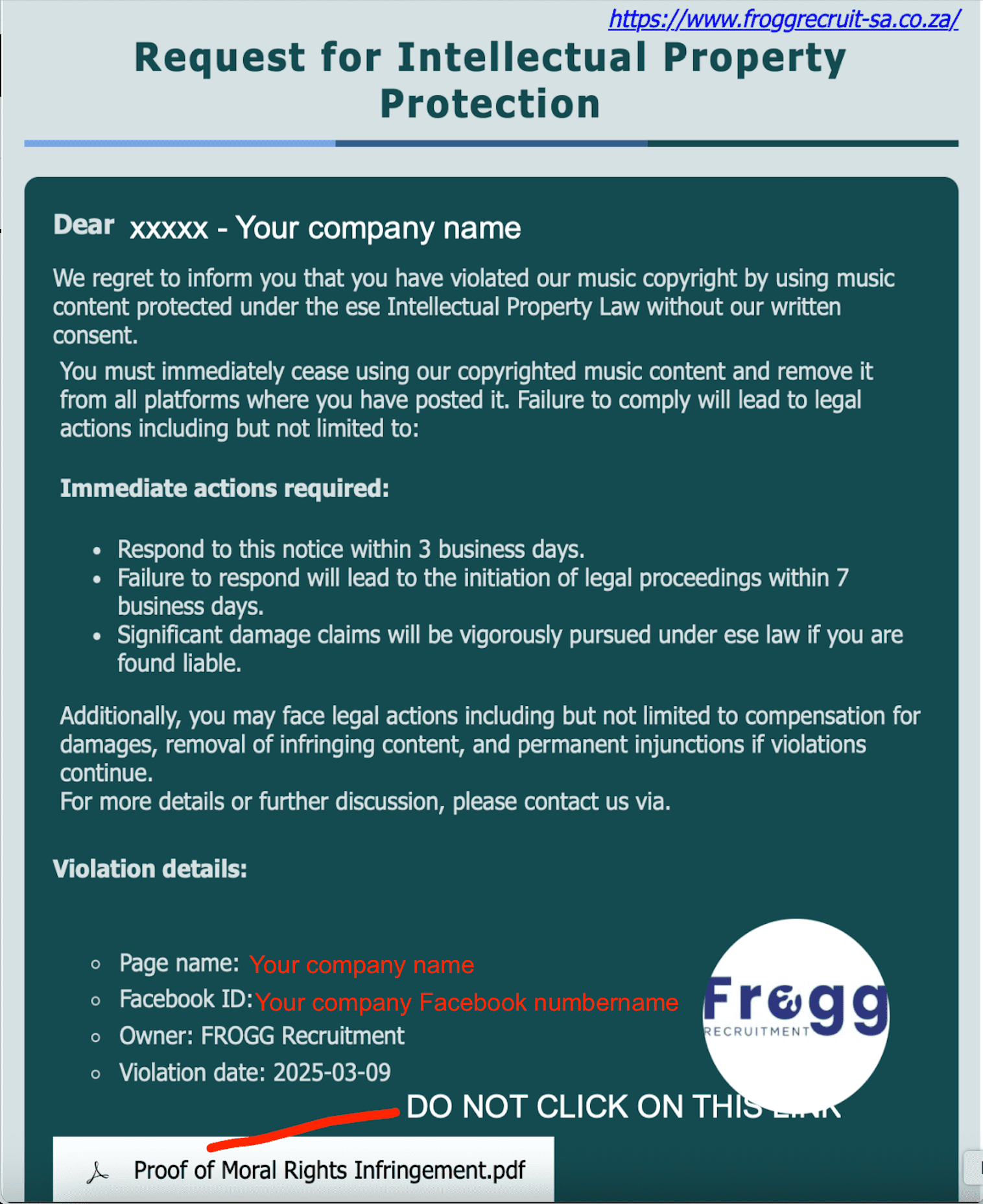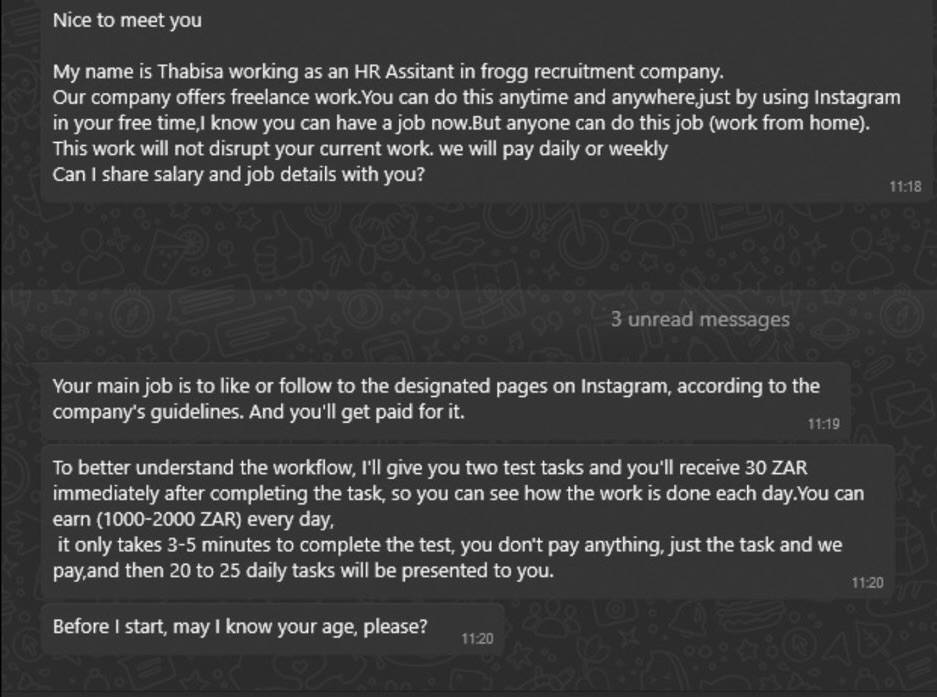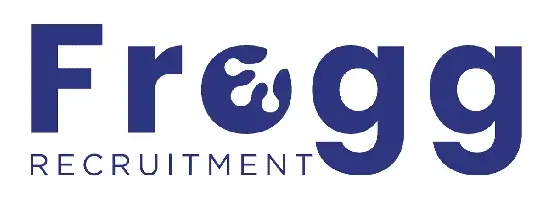EMAIL SCAM ALERTS

SCAM ALERT
To Whom It May Concern
Please take note that certain people are sending messages via email regarding Request for Intellectual Property Protection.
Claiming that you have violated our music copyright by using music content protected under ese Intellectual Law without our written consent.
This is is scam. Please delete the email, DO NOT CLICK ON ANY OF THE LINKS. They might hack your phone, so don’t give them any attention.
You will receive a message as shown in the photo. Your company name will be indicated in the email.
VARIOUS SCAM ALERTS
In particular, job searchers are encouraged to exercise extreme caution when disclosing personal information unless they have verified the request’s legitimacy directly with the service providers.
Six red flags that suggest a potential job scam
1. Emails from a free account
Be wary of recruiters/scamers using free web e-mail accounts from services like Gmail or Hotmail as opposed to using a business email address to contact you.
There may also be tell-tale signs within the email itself, too. While some scammers may send out well-written emails, many will seem unprofessional.
If the email contains excessive spelling or punctuation mistakes, incorrect capitalisation, or poor grammar, it could be from a fake recruiter.
It’s also important to consider attachments sent in emails. If you are unsure about the legitimacy of the file, use a virus scanner before opening it. Some scammers may send attachments that contain viruses designed to corrupt your device and extract personal information.
2. Asking for money or unnecessary personal information before submitting your application
While discussing job opportunities, you should not be asked for payment.
Some scammers might ask you to set up a new bank account and give them the details or send you to a website and fill out a credit report form. In these instances, the scammer might say that they need your personal details to put you onto the company insurance.
3. Recruiters being evasive when asked about the job in question
Real recruiters should always be knowledgeable about the job they’re recommending. If they seem vague, skirt around questions regarding the hiring process, or gloss over the finer details – this should set off alarm bells.
If the recruiter avoids addressing your questions adequately, it’s a clear indication that their identity may be fabricated, and this raises doubts about their legitimacy.
However, it’s important to note that there are instances where legitimate recruiters have confidential positions and are unable to reveal the client’s name. Nevertheless, they should still possess industry knowledge and be able to provide as much information as possible about the role.
4. Fake job offers that sound too good to be true
Job posting scams typically make their job offers as appealing as possible to entice people to share information. Be on your guard if they present a job opportunity that seems too good to be true.
Whilst most job descriptions highlight the benefits of a role, fake descriptions may have an abnormally long list. They may also say ‘no experience necessary’ and have shorter hours than expected of the role in question.
5. Instantly offering a high salary
Similar to the point above, fake job offers tend to include unrealistically high salaries. For example, a starting salary that is 50-100% above the average salary market rate is unlikely to be real.
If the salary offered seems at odds with the role, it’s worth questioning whether the job is part of a scam.
6. Offering you the job without an interview
Some scammers may even offer you the job without putting you through an interview process. Some will go further and have an interview with you on the phone, but will only cover basic questions about your previous job experience.
Another tactic scammers use is to invite you to an online job interview using an unfamiliar or insecure messaging service. Scammers can obtain your details by asking you to set up an account on the online chat platform. It is recommended that you research any software or websites you are invited to sign up to.
Part of a genuine recruiter’s job is to spend time ensuring you’re the right fit for the company that’s hiring. If they offer you the role without even putting you through a job interview process, chances are it’s a scam.
Professionals can lower their chances of being victims of phishing emails by implementing all of the following strategies, which we recommend:
Never reply to an email asking for personal information (passwords, ID, bank account information, etc.). Find the service provider’s phone number or email address on their website and give them a call to confirm the request if you are unsure.
Examine the email text for spelling and grammar mistakes, as these are often signs of a fake email. Scammers often try to counterfeit an email signature by replicating a company’s logo. Examine the email address from the source and contrast it with the email design seen on the websites of the service providers.
If the user is unsure, they can verify if it’s authentic by clicking and holding the link on a mobile device. This will display the page’s URL or web address.
Refrain from clicking on suspicious links and consider your options before clicking.
How to find out if a recruitment agency is legitimate
It might seem scary that people would go to these lengths to scam somebody, but luckily, there are several ways to check whether a recruitment agency is genuine.
Here are five tips for jobseekers to spot a fake recruiter. By following these practical steps, you can confidently navigate your job search and stay vigilant and safeguard yourself from potential recruiter scams.
Ask the right questions
Regardless of whether a recruiter is legitimate, you should always ask questions when discussing a job role. This is especially important if you suspect you’re being targeted by a job recruiter scam. Don’t shy away from checking their credentials and asking questions about their experience, contact information and company.
Good questions to ask in this situation include:
Have you placed any previous candidates with your client?
What can you tell me about the company’s culture?
What opportunities are there for growth in this role?
Please can you tell me more about the role?
How long has the company been operating?
Legitimate agencies always invest time and effort into the recruitment process and, even if the role is confidential, should be able to answer the majority of your questions.
Check their LinkedIn profile
If you get contacted by a recruiter, exercising caution and verifying their identity should be your first port of call. LinkedIn is a valuable resource for assessing the credibility of a recruiter.
Here are some steps you can take to verify the recruiter:
Conduct a LinkedIn profile assessment
When researching a recruiter on LinkedIn, take note of the recruiter’s connections and their level of engagement on the platform. If their profile has a lack of connections, no track record of sharing or posting about job openings, or incomplete information, these could be red flags indicating a fake profile. Legitimate recruiters typically have well-established professional networks and maintain comprehensive profiles.
Conduct a Google search
For a more comprehensive investigation, take the recruiter’s profile photo and the text from their bio, and input it into a Google Search. Scammers frequently pilfer information from legitimate recruiters to construct misleading profiles. By conducting this search, you can detect if the same profile photo or bio text appears elsewhere on the internet, which could indicate potential fraud.
Investigate their company connections on LinkedIn
Verify if the recruiter’s LinkedIn profile is linked to their agency’s corporate page. Legitimate recruiters are typically associated with an official firm and maintain a connection to their company’s LinkedIn page. If the recruiter’s profile lacks a link to their company profile, it could suggest that they are not affiliated with an authorised recruitment agency.
Research the job being advertised
Thoroughly research the job posting to determine its authenticity. Check the job posting to see if it’s available on the company website. Real job opportunities are usually showcased on a company’s official careers or job opportunities page. Go one step further and cross reference this to see if the job offer has also been posted on job boards or career websites.
If you discover that the job is not listed on the company’s page, this could be an indicator that this is a recruitment scam. Genuine companies usually advertise their job openings on various platforms to attract qualified candidates. Therefore, if a job offer is not present on any official or reputable websites, it may indicate that the offer is suspicious and should be further investigated.
SMS AND WHATSAPP SCAM ALERTS

SCAM ALERT
To Whom It May Concern
Please take note that certain people are sending messages on WhatsApp posing as HR assistants from FROGG Recruitment.
This is fraud. Please report and ban them from WhatsApp. They might hack your phone, so don’t give them any attention.
You will receive a message as shown in the photo. The person’s name is always changing.
